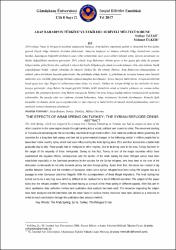| dc.contributor.author | Tatar, Volkan | en_US |
| dc.contributor.author | Ülker, Mehmet | en_US |
| dc.date.accessioned | 2019-10-29T17:59:56Z | |
| dc.date.available | 2019-10-29T17:59:56Z | |
| dc.date.issued | 2017 | |
| dc.identifier.uri | http://www.trdizin.gov.tr/publication/paper/detail/TWpZM01UUTJOZz09 | |
| dc.identifier.uri | https://hdl.handle.net/20.500.12294/2260 | |
| dc.description | Tatar, Volkan (Arel Author) | en_US |
| dc.description.abstract | 2010 yılında Tunus'ta bir gencin kendisini yakmasıyla başlayan Arap Baharı, toplumsal, politik ve ekonomik bir kriz haline gelerek birçok bölge devletini derinden etkilemiştir. Tunus'ta başlayan ve domino etkisiyle bölge devletlerine yayılan hareket, başlangıçta bölgedeki devletlerin uzun yıllar yönetiminde olan siyasi elitleri tedirgin etmiş, sürecin devamında ise iktidar değişiklikleri meydana getirmiştir. 2011 yılında Arap Baharının etkisine giren ve her geçen gün daha da çatışma bölgesi haline gelen Suriye'den, yaklaşık 4 milyon kişi başka bölgelere göç etmek zorunda kalmıştır. Göç eden kitlenin büyük çoğunluğunun hedefi, coğrafi yakınlığın da etkisiyle Türkiye'dir. Bu sebeple Türkiye, Arap Baharının olumsuzluğunu ve yükünü çeken devletlerin başında gelmektedir. Dış politikada olduğu kadar, iç politikada da tartışma konusu olan Suriyeli mülteciler için, özellikle güneydoğu illerinde sığınma kampları kurulmuştur. Ayrıca Suriyeli mültecilerin, Avrupa devletlerine kaçak geçiş için, Ege Bölgesi'ni kullanmalarından dolayı bu mesele, Türkiye ile Avrupa Birliği'ne üye devletleri de karşı karşıya getirmiştir. Arap Baharı bu kaçak göçlerle birlikte farklı devletlerin ortak ve içinden çıkılması zor sorunu haline gelmiştir. Bu çalışmanın konusu, Arap Baharı sonrasında Türkiye'nin karşı karşıya kaldığı mülteci sorununu farklı açılardan irdelemektir. Bu amaçla nitel veri toplama yöntemi kullanılmış, belge incelenmesi üzerinde durulmuştur. Konuyla ilgili kaynaklar incelenmiş, farklı yayın organlarında yer alan röportaj ve haberlerden de kaynak olarak faydalanılmış, nitel veri analiziyle sonuca ulaşılmaya çalışılmıştır | en_US |
| dc.description.abstract | The Arab Spring, which was triggered by a young boy’s burning himself up in Tunusia, has had an impact on most of the other countries in the same region deeply through turning into a social, political and economic crisis. The movement starting in Tunusia and spreading into the surrounding countries through domino effect, first made the political elitists governing the countries for a long time feel uneasy and then led to governmental changes in the following period. 4 million people had to leave their home country Syria, which had been influenced by the Arab Spring since 2011 and then turned into a battle field gradually day by day. These people had to immigrate to other regions. Due to its being close to the area, Turkey has been in the target of the majority of these immigrants. Owing to this fact, Turkey is one of the major countries which have experienced the negative effects, consequences and the burden of the Arab Spring the most. Refugee camps have been established especially in the Southeast provinces in the country for the Syrian refugees, who have been at the core of the discussion continuously in not only domestic policy but also foreign policy. Apart from that, this issue has created a big conflict between Turkey and the members of European Union since Syrian refugees have been using The Aegean Sea as a passage to enter European countries illegally. With the accompaniment of these illegal migrations, The Arab Spring has turned out to be a very big issue which is difficult to be resolved for a lot of different countries. The subject of this paper looks into the refugee problem Turkey has been facing as a result of the Arab spring in different aspects. With this aim in mind, qualitative data collection method and qualitative data analysis has been used. The resources regarding the subject have been analyzed and the interviews and the news found in various media resources have been utilized as a resource in order to reach conclusions through the qualitative data analysis method | en_US |
| dc.language.iso | tur | en_US |
| dc.relation.ispartof | Gümüşhane Üniversitesi Sosyal Bilimler Enstitüsü Elektronik Dergisi | en_US |
| dc.rights | info:eu-repo/semantics/openAccess | en_US |
| dc.subject | Sosyal Bilimler Tarihi | en_US |
| dc.title | Arap baharının Türkiye’ye etkileri: Suriyeli mülteci sorunu | en_US |
| dc.title.alternative | The effects of Arab spring on Turkey; The Syrian refugee crisis | en_US |
| dc.type | article | en_US |
| dc.department | İstanbul Arel Üniversitesi, İktisadi ve İdari Bilimler Fakültesi, Siyaset Bilimi ve Kamu Yönetimi Bölümü | en_US |
| dc.identifier.volume | 8 | en_US |
| dc.identifier.issue | 21 | en_US |
| dc.identifier.startpage | 278 | en_US |
| dc.identifier.endpage | 288 | en_US |
| dc.relation.publicationcategory | Makale - Ulusal Hakemli Dergi - Kurum Öğretim Elemanı | en_US |


















